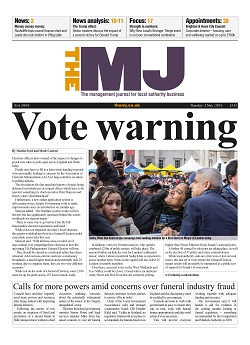Our bereavement and registration services has contact with families on some of the most important days of people’s lives; be that on their wedding days, the birth of a child or the death of a loved one and arguably, it carries out some of the most meaningful tasks that the council provides. However, on a day to day basis, it goes about its business in such a seamless way that it often slips under the radar.
By this week almost all of our main services will be operational again in one form or another with Birmingham’s first two couples getting married since lockdown began. I wanted to take this opportunity to reflect on this service and look at what we’ve achieved and what is to come.
When the country went into lockdown, many council services had to be swiftly significantly changed to make sure they could continue safely. But, the sheer scale of what this service has achieved in the last few months makes me so proud. When lockdown started, we knew that bereavements would significantly increase but I still don’t think anyone was, or could have been, fully prepared for what came.
Over April and May alone, Birmingham registered 3,254 deaths. To cope with this level of demand, so many things had to change:
- Staff had to be redeployed and the process itself had to be changed to try and get deaths registered as quickly as possible, to allow funerals to then take place.
- Separate to the regional West Midlands facility, we built a temporary mortuary that had capacity to store 500 bodies. This was in a bid to alleviate the burden of storage on the NHS and funeral directors.
- And finally, we had to take the really difficult decision to limit the number of mourners allowed to attend funerals to six.
This last point was certainly the most controversial and difficult decision I’ve had to make. But, our overriding viewpoint throughout this whole saga has been the safety of the public and of our staff. At the time, the level of infection was surging, and the number of open graves we had to prepare, meant that to socially distance, we simply didn’t have the space to allow more than six people to attend. This has since been increased to sixteen as we’ve seen the number of funerals decrease and the number of infections slow.
We had significant opposition to this and while, to some degree, I expect to receive some challenging behaviour, the level of abuse aimed at our staff was horrendous. It wasn’t just verbal abuse but physical as well and at one stage, a staff member was even driven at by a car. My hope moving forward is that we see an end to this type of abuse as people start to appreciate what these members of staff have done for the city.
But we’re not out of the woods yet. While lockdown was in place, the registration of births and marriages could not take place. While we had 3,254 deaths to register, we now have the much happier task of registering more than 5,000 births.
This is going to be no mean feat. Particularly as government recently changed legislation for how this process must take place. While we ordinarily would just carry out a face to face appointment for parents to sign the register, we now have a two-step process that we must follow. A registrar must first call the family to take some details, and then the same registrar must witness them sign the form in a face-to-face appointment. Had government consulted local authorities before establishing this mandated process, we would have gladly advised them that this will slow down our work substantially. A number of our registrars work part-time and for those who work full-time, many have not yet been able to take annual leave. This means that the time between the original first step phone call and the second step appointment will delay the process and, if anyone is on annual leave or becomes ill and has to take time off, the appointment will have to be rescheduled leading to yet more time being taken.
As with other local authorities around the country, we are finding out about significant changes to processes as they are announced on TV. Not only does this mean that we can’t provide the government with support and expert knowledge, but it means that councils are continually behind the curve and having to put rushed processes into place which may not be either the right thing to do or the most effective way of working.
What I think is clear from this pandemic are two things. First, that our dedicated registration and bereavement staff fully deserve a well-earned break, a round of applause and much more respect, the likes of which is automatically given to our hardworking NHS, teachers or social care workers.
The second is greater collaboration between national and local government. Councils across the UK provide a huge range of services, but as we have seen in our registration services, they would be so much more effective if government listened and applied the learning and knowledge gained from our frontline staff. In places, both government and councils have suffered from a lack of clear guidance when there was no set figure around attendance at funerals. In other areas, it’s been too prescriptive, as with the birth registration process. Wouldn’t this be wonderful if it could be ever so simply cured by a matter of communication.
Cllr Sharon Thompson is cabinet member for homes and neighbourhoods at Birmingham City Council
Decision to cut mourners led to 'horrendous' abuse of council workers



